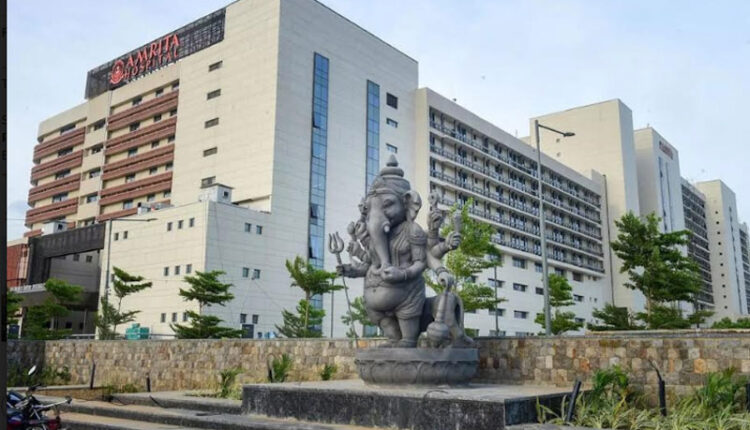Amrita Hospital, Faridabad has been the first centre in Northern India to launch a CAR-T cell therapy program
FARIDABAD : Amrita Hospital in Faridabad has introduced CAR T-cell (Chimeric antigen receptor) therapy for certain cancer patients, which is considered a significant breakthrough in B cell lymphoma and leukemia treatment, with promising results in relapsed and refractory patients. Four patients of B-cell Lymphoma have already undergone or undergoing this therapy at Amrita Hospital so far and they are under follow-up.
CAR T-cell therapy is not commonly available in India and very few clinical centers in the country have access and expertise to deliver it. It involves genetically modifying a patient’s T cells in the laboratory, enabling them to specifically attack certain cancer cells. These T cells are then infused back into the patient’s body.
Dr. Prashant Mehta, Senior Consultant, Program Director (Lymphoid neoplasms & Cellular Therapy), Dept. of Medical Oncology/Hematoncology/BMT, Amrita Hospital, Faridabad said, “The treatment of cancer has improved immensely in the last few decades, and now we are in an era where we are able to harness the power of our immunity and channelize its strength to target cancer cells, with minimum effects on other organs or the body as a whole. A novel and refined way of harnessing our immune cells is CAR T-cell therapy which, in true sense of the word, is composed of ‘living drugs.’ CAR-T cells are living T-lymphocytes of a patient which are genetically reprogrammed to target specific proteins on the surface of cancer cells and kill them. This kind of ‘cellular therapy’ treatment has been proven to be very effective for only some types blood cancers as of now (B-cell Lymphoma, B-cell ALL & Multiple Myeloma).”
The procedure involves extracting white blood cells from the patient. The T lymphocytes so extracted are modified to express the chimeric antigen receptor (CAR) on their surface. This takes about 3-4 weeks, after which these cells are infused back into the patient after conditioning chemotherapy. This ‘living drug’ can stay in the patient’s body for many months and years, killing all residual cancer cells and even curing resistant cancers. Unlike chemotherapy, CAR T-cell therapy is generally administered only once to the patient and holds the promise of permanent cure for certain specific types of cancer.
Dr. Prashant Mehta said: “At present, CAR T-cell therapy is helpful in relapsed /refractory B cell ALL, more as a bridge to Allogenic BMT, except in patients who are not eligible for intensive treatment where it can be used as a definitive treatment. Similarly, it is useful in relapsed/refractory B cell lymphoma and Myeloma. This therapy does not work for all patients, and one must discuss with the treating oncologist whether they could be candidates for this treatment. CAR T-cell therapy, in suitable high grade B cell Lymphoma patients can provide a response rate of 70% and long-term cure rate of about 40%. In relapsed/refractory B cellALL (Acute Lymphoblastic Leukemia) response rates are 90% and long-term cure rate is about 60% for CAR T-cell therapy.”
Said Dr. Sanjeev Singh, Medical Director, Amrita Hospital, Faridabad, “Administration of CAR T-cell therapy at Amrita Hospital opens the door to many more patients to avail this treatment, as this therapy has so far been inaccessible to most Indians. We are closely collaborating with researchers in India and abroad in the field of CAR immunotherapy and aim to improve access to CAR immune cell therapies for those in need. We are now developing a national-level collaborative cell therapy lab which will cater to needs of patients on a larger scale. The goal is to develop ‘Institutional CAR T-cells’ in our own hospital which will improve access to this treatment and bring it within reach of most of the Indian population.”
“Amrita Hospital, Faridabad has been the first centre in Northern India to launch a CAR-T cell therapy program.”
Amrita Hospital, Faridabad and ImmunoACT have entered into a strategic partnership to ensure patients across all segments benefit from this life-saving advanced medicine.
The sourcing and manufacturing of CAR-T cells for this therapy is being done in collaboration with ImmunoACT, an IIT Bombay incubated company. After successful completion of it’s pivotal Phase I/II clinical trials, ImmunoACT received Marketing Authorization approval from Central Drugs Standard Control Organization’s (CDSCO) for its CAR-T cell therapy product (brand name “NexCAR19”) in October 2023 for treatment of relapsed/refractory B-cell lymphomas and leukemia. NexCAR19 is India’s first commercially available CAR-T therapy that is fully integrated and indigenously developed CAR-T therapy.
As per ImmunoACT’s Founder and CEO – Dr Rahul Purwar “Our vision is to ensure that cutting-edge cell and gene therapy products are available in India through indigenous R&D that provides access at affordable price. We need to put India on the global map in the space of advanced medicines.” Adding, ImmunoACT’s Co-founder, and Director – Strategy & Business Development, Shirish Arya said, “NexCAR19’s clinical results are benchmarked with the best-in-class globally in terms of efficacy and outperforms on its safety profile. We are very proud to partner with Amrita Hospitals to launch this made-in-India product for the benefit of patients across all sections of society in India”.

